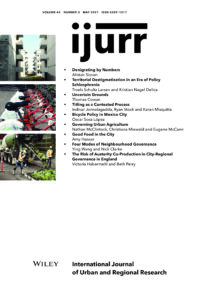As municipalities across the global North highlight urban agriculture as a marker of their ‘greenness’, how can we best understand how the spaces and practices of urban food production are governed? This article develops an analysis of urban agriculture as a complex site of governance in which numerous interests engage. We underscore the politics of governance, through which some actors resist the imposition of a narrowly normative and exclusive notion of urban agriculture and against which they envision and enact alternatives. The article contributes to efforts to transcend the often dichotomous framing of urban agriculture as radical or neoliberal, formal or informal, political or post‐political by employing ‘everyday governance’ and ‘everyday resistance’ as lenses through which to focus on the prosaic practices of engaging with, pushing back against, and stepping beyond the imposition of hegemonic models of urban agriculture. We argue that the co‐constitutive, ‘braided’ nature of urban agricultural governance is revealed through attention to the manifold forms of negotiation and resistance to formal urban agricultural governance. Moreover, our perspective highlights the ways that some practitioners are excluded by, challenge, or re‐vision formal definitions of urban agriculture. We draw on the cases of Portland, OR and Vancouver, BC to illustrate our argument.
Details
Written by:
Nathan McClintock, Christiana Miewald & Eugene McCann
Digital Object Identifier (DOI)
10.1111/1468-2427.12993
About DOI
Read full article as PDF
Read full article as HTML
See the references for this article

